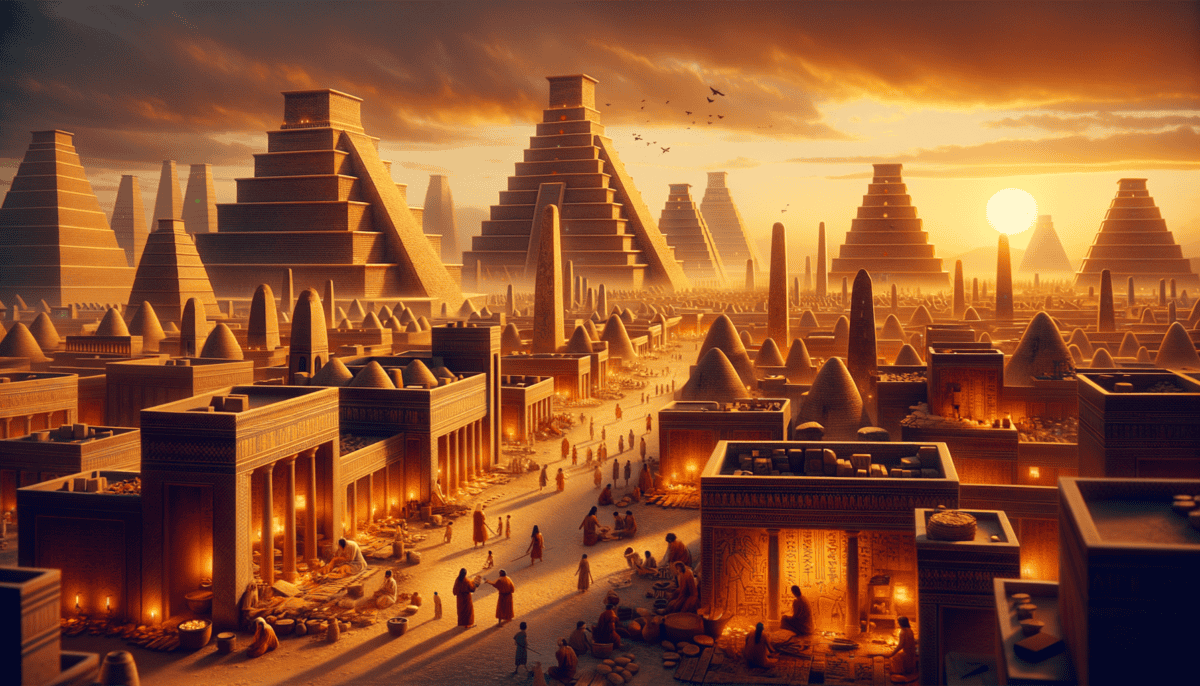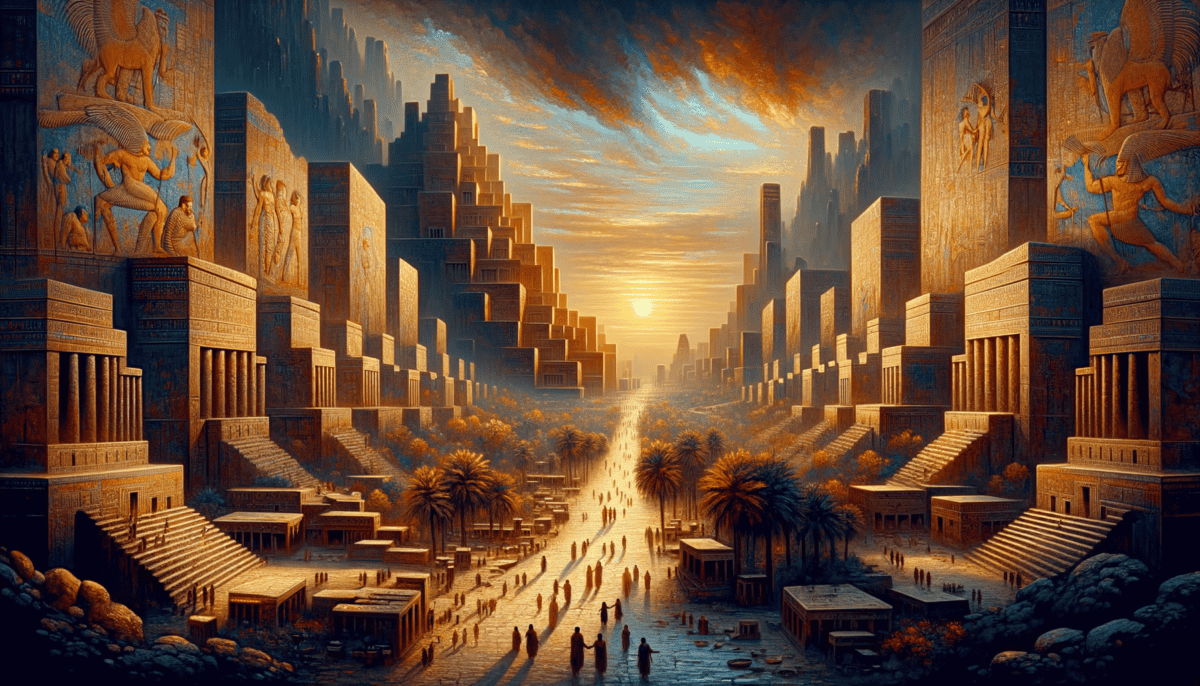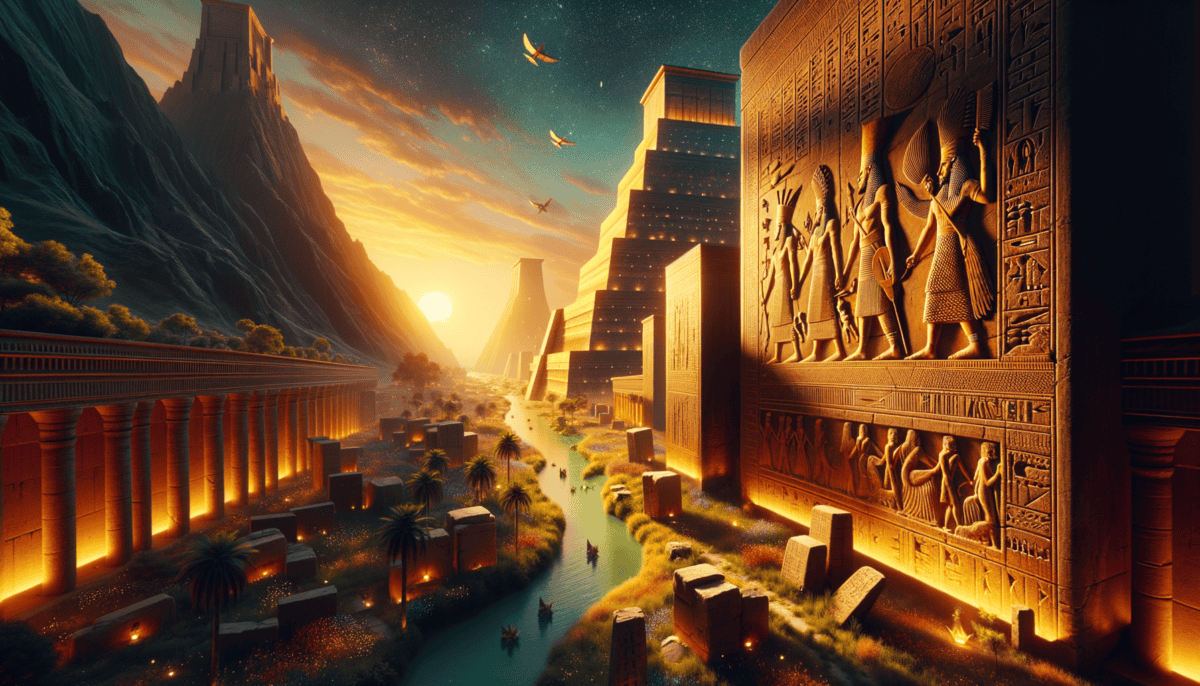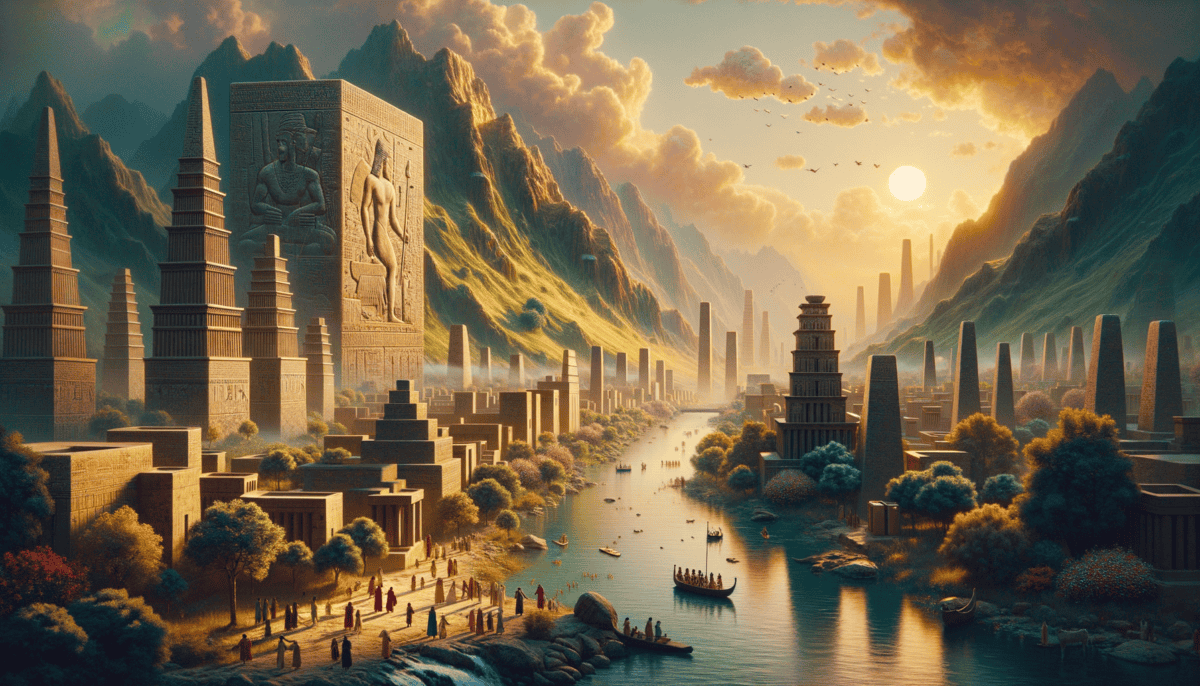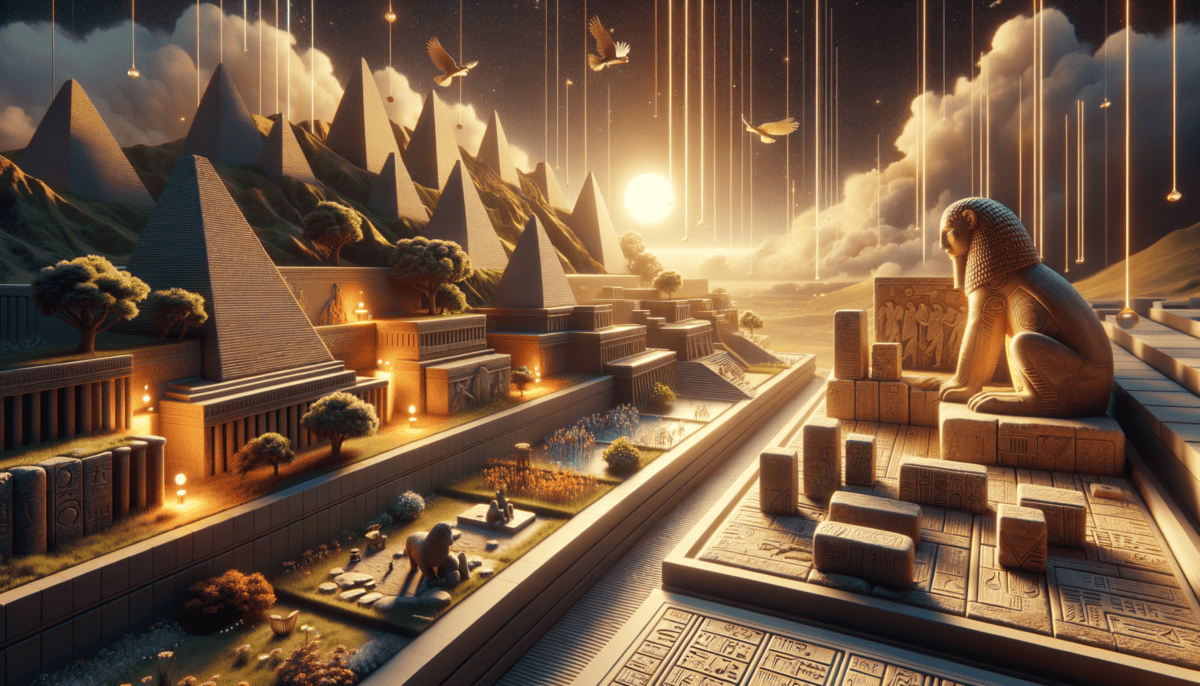The Land Between the Rivers
Long, long ago, in a special place where two big rivers flowed, something amazing happened. This place was called Mesopotamia, which means "the land between the rivers."
The two rivers were named the Tigris and Euphrates. They were like giant water highways that brought life to the dry land. Every year, these rivers would overflow, leaving behind rich, dark soil that was perfect for growing food.
"Look at how the water makes everything grow!" little Adad said to his father as they walked along the riverbank. Their bare feet sank into the soft mud, and the warm sun sparkled on the water.
His father smiled and pointed to the green plants sprouting everywhere. "The rivers are our friends, my son. They give us everything we need to live."
At first, only small groups of people lived here. They would move from place to place, looking for food. But then they made a big discovery – they could plant seeds and grow their own food!
“When we learned to farm, everything changed,” Grandmother Inanna would tell the children. “We didn’t have to wander anymore. We could build homes and stay in one place.”
The people built their houses from mud bricks dried in the sun. They created clever ways to water their crops by digging small channels from the rivers to their fields. This was called irrigation, and it was like giving the plants their own little rivers!
Soon, more and more people came to live near the rivers. They built bigger houses, then whole villages. They learned to work together and share the land.
The farmers grew many different foods:
• Wheat for making bread
• Dates from tall palm trees
• Onions and garlic
• Peas and lentils
Life wasn't always easy. Sometimes the rivers flooded too much, and sometimes not enough. But the people were clever. They worked together to solve problems and protect their homes.
"We must respect the rivers," the village elder would say. "They can bring both good and bad, but they are the heart of our land."
The children would play in the fields while their parents worked. They made up games and songs about the rivers and the growing plants. They watched birds build nests in the date palms and fish swim in the irrigation channels.
As the sun set each evening, painting the sky in beautiful colors, the people would gather to share stories. They talked about their day, made plans for tomorrow, and thanked the rivers for their gifts.
Little by little, these clever people built something amazing. They created the first civilization, right there between the two rivers. They showed the world that when people work together and use their minds, they can do incredible things.
And all of this happened because two rivers met in a special place called Mesopotamia, where the story of cities began.
Cities Rise from the Sand
The tiny villages between the rivers grew bigger and bigger. Soon, they became the world’s first cities! ️ These special places were called Ur, Uruk, and many other names that sounded like music.
In the city of Uruk, little Enlil watched workers stack sun-dried bricks higher and higher. “What are they building, mama?” he asked.
“They’re building a ziggurat,” his mother explained. “It’s like a giant stairway to the sky, where our priests can talk to the gods.”
But the most exciting thing happening in these cities was a brand new invention – writing! People needed a way to keep track of all their trading and farming. So they made special marks in soft clay tablets.
“Look at these marks,” said Teacher Nisaba, showing her students a clay tablet. “Each picture tells us something. This one means ‘sheep,’ and this one means ‘grain.'”
The children practiced making marks in their own clay tablets. This special writing was called cuneiform, and it changed the world forever!
The cities were full of amazing new things. People learned different jobs and skills:
• Scribes who wrote on clay tablets
• Potters who made clay pots
• Weavers who made cloth
• Metalworkers who made tools
• Priests who led ceremonies
• Farmers who grew food
In the marketplace, little Enheduanna loved watching people trade. “I’ll give you this pot for three sheep,” one person would say. “How about some dates for this beautiful cloth?” said another.
The cities had leaders called kings who helped make important decisions. They lived in big palaces and worked with priests to take care of everyone.
“Our city is like one big family,” the king of Ur would say. “We must all work together to make it strong and happy.”
The Sumerians were very clever people. They made many important inventions:
They created a calendar with 12 months
⏰ They divided time into hours and minutes
They invented a number system we still use parts of today
They made beautiful music with harps and drums
At night, families would gather on their roof terraces to catch the cool evening breeze. Parents told stories about the stars, while children played games with clay marbles and toy wagons.
“Tell us about the old days,” the children would beg their grandparents. “Tell us how our city began!”
And so the stories were passed down, generation after generation, written in clay and carved in stone. The great cities grew stronger and more beautiful, shining like jewels in the desert sun.
The world’s first cities showed that when people come together, share ideas, and help each other, they can build amazing things that last forever.
Kings and Stars Above
A brave king named Sargon brought big changes to the land between the rivers. He was very strong and smart. He joined many cities together to make the first empire!
Little Maya sat at her grandfather’s feet, eyes wide with wonder. “Tell me about King Sargon again!”
“Ah, little one,” her grandfather smiled. “They say Sargon started as a gardener’s helper. But he was so clever and brave that he became the greatest king of all!”
After Sargon, another amazing king named Hammurabi came along. He had a very special idea – to write down all the rules that people should follow.
“Everyone should know what’s right and what’s wrong,” Hammurabi said. “Even kings must follow these rules!”
• Be kind to others
• Tell the truth
• Help people who need help
• Don’t take things that aren’t yours
But the people of Mesopotamia weren’t just good at making rules – they loved looking at the stars!
“Look up there,” Teacher Anu told his students one night. “See how the stars make pictures in the sky? We can use them to know when to plant our crops!”
The star-watchers made amazing discoveries:
They made a calendar with 12 months
⭐ They named many stars and planets
They learned to predict when the moon would be full
They used math to measure the sky
In the temple school, young scribes learned to count in a special way. “We count by sixties,” explained the teacher. “That’s why we have 60 minutes in an hour!”
Little Marduk raised his hand. “But why sixty?”
“Because sixty can be divided into many smaller numbers easily,” the teacher smiled. “It’s very helpful for trading and building!”
The people also loved to solve puzzles with numbers. They made up math problems that we still use today!
One day, a group of children played a counting game in the marketplace. “I have 12 dates,” said one. “If I share them with 3 friends, how many will each friend get?”
As the empire grew bigger, people from different places shared their ideas. They learned from each other and became even smarter!
At night, families would gather to hear stories about the brave kings and clever star-watchers. “Our people have learned so much,” the storytellers would say. “And there is still so much more to learn!”
The stars twinkled above, just as they had in Sargon’s time, watching over a land where kings made fair rules and scholars counted the lights in the sky.
Tales of Gods and Heroes
Long ago, in the city of Uruk, people loved to share stories. One special story was about a mighty hero named Gilgamesh.
“Tell us about Gilgamesh!” the children begged their storyteller one evening. They sat in a circle, eyes sparkling with excitement.
“Gilgamesh was the strongest king ever,” the storyteller began. “He could lift huge stones and fight fierce monsters. But he was lonely because he didn’t have any friends.”
The gods saw that Gilgamesh needed a friend. They made a wild man named Enkidu who was just as strong as Gilgamesh.
“At first, Gilgamesh and Enkidu fought each other,” the storyteller continued. “But then they became best friends!”
• They fought a scary monster in the forest
• They went on long journeys
• They helped each other be brave
• They learned about friendship
The people of Mesopotamia also told stories about their gods. They believed the gods lived in the sky and helped make the world better. ⭐
“Each god has a special job,” Grandmother explained to little Nin. “Shamash makes the sun shine. Ishtar brings love and rain. Ea brings wisdom.”
Every city had its own special temple called a ziggurat. It looked like a giant staircase reaching up to the sky!
“Why do we give gifts to the gods?” asked little Nin.
“To thank them for taking care of us,” Grandmother smiled. “For making the crops grow and keeping us safe.”
The people also had special celebrations for their gods. They would sing, dance, and have big feasts!
During the New Year festival, everyone in the city joined in the fun. They wore bright clothes and sang happy songs.
But the stories weren’t just for fun – they helped people understand important things about life:
Be kind to others
Be brave when things are hard
Love your friends and family
Always try to learn and grow
Every night, families would gather to share these special tales. Children would dream of brave heroes and magical adventures.
The stories spread far and wide, carried by travelers to distant lands. People everywhere learned about Gilgamesh and his amazing friendship with Enkidu.
“Even today,” the storyteller said, “these ancient tales remind us that everyone can be a hero by being brave and kind.” ❤️
As the stars came out, just like in Gilgamesh’s time, the children imagined their own adventures, dreaming of the heroes they could become. ✨
A World of Trade and Adventure
The marketplace in ancient Mesopotamia was buzzing with excitement! People from far-off lands came to trade their special items.
“Look at all these wonderful things!” little Adad said to his father. They walked through the busy market streets of Ur.
“Where did all these things come from?” Adad asked, his eyes wide with wonder.
“Some came from places far across the sea,” his father smiled. “Others traveled down the great rivers on boats.” ♂️
The trading boats were amazing! They carried:
• Soft wool from sheep herders
• Strong wood from cedar forests
• Shiny copper and gold for jewelry
People didn’t just trade things – they shared ideas too!
“When traders visit,” the wise teacher explained, “they bring new ways to build things, make pottery, and grow food.”
“Tell me about the traders!” Adad begged his father. He loved hearing stories about faraway places.
“Some come from lands where it’s very cold,” his father said. “Others from places where it’s always hot and sandy.”
The traders brought new foods too! Sweet dates, juicy pomegranates, and crunchy nuts. Everyone loved trying new tasty treats.
At the market, you could hear many different languages. People learned to talk with hand signs and friendly smiles!
Some clever traders made special seals to mark their goods. Each seal had a pretty picture carved on it.
The trade routes were like bridges connecting different lands:
River routes on the Tigris and Euphrates
Desert paths for camel caravans
♂️ Mountain trails for brave travelers
“Our city is special,” the market master said proudly. “It’s where people from everywhere come to meet and trade!”
Trading helped make Mesopotamia rich and strong. People learned new things and made many friends.
As the sun set, Adad watched the traders pack up their goods. He dreamed of becoming a trader too, visiting far-off lands and making new friends.
“Tomorrow will bring more treasures,” the market master said. “And more wonderful stories to share!” ⭐
The busy marketplace showed how people from different places could work together and be friends. It was a special place where everyone could learn and grow!
A Special Gift from the Past
Today, we can see how the amazing ideas from ancient Iraq still help us!
“Grandpa, what’s that round thing on your desk?” asked little Sarah, pointing to an old clock.
“That’s one of the many gifts we got from ancient Mesopotamia,” Grandpa smiled. “The people there were the first to divide time into hours and minutes!” ⏰
• The first schools
• The first written stories
• The first wheels
• The first farms
• The first cities
“Wow!” Sarah’s eyes grew wide. “They must have been very smart!”
“They were!” Grandpa nodded. “Every time you write something down, you’re using an idea that started in ancient Iraq.”
“Even when you play in your toy car,” Mom added, “you’re using their special invention – the wheel!”
“Tell me more!” Sarah bounced excitedly. She loved learning about the past.
“Well,” Grandpa began, “when you plant seeds in our garden, you’re doing something people in ancient Iraq figured out first. They learned how to grow food and started the first farms!”
“And remember those pretty buildings we saw downtown?” Mom asked. “People in ancient Iraq were the first to build big cities where lots of people could live together.” ️
Sarah looked at her math homework. “Did they do math too?”
“They sure did! They were great at math and even studied the stars. Many of the ways we count things came from them!” ⭐
Sarah thought about all the wonderful things these ancient people created. “They helped make our world better!” she said proudly.
“That’s right!” Mom smiled. “And just like them, we can keep learning and creating new things to help people in the future.”
The spirit of discovery and sharing that started in ancient Iraq continues today. Their clever ideas and love of learning still inspire us to dream big and work together.
As Sarah went to bed that night, she thought about all the wonderful gifts from ancient Iraq. She dreamed of making her own discoveries to share with the world.
“Good night,” Grandpa said softly. “Tomorrow brings new chances to learn and grow, just like the people of ancient Iraq taught us.”


